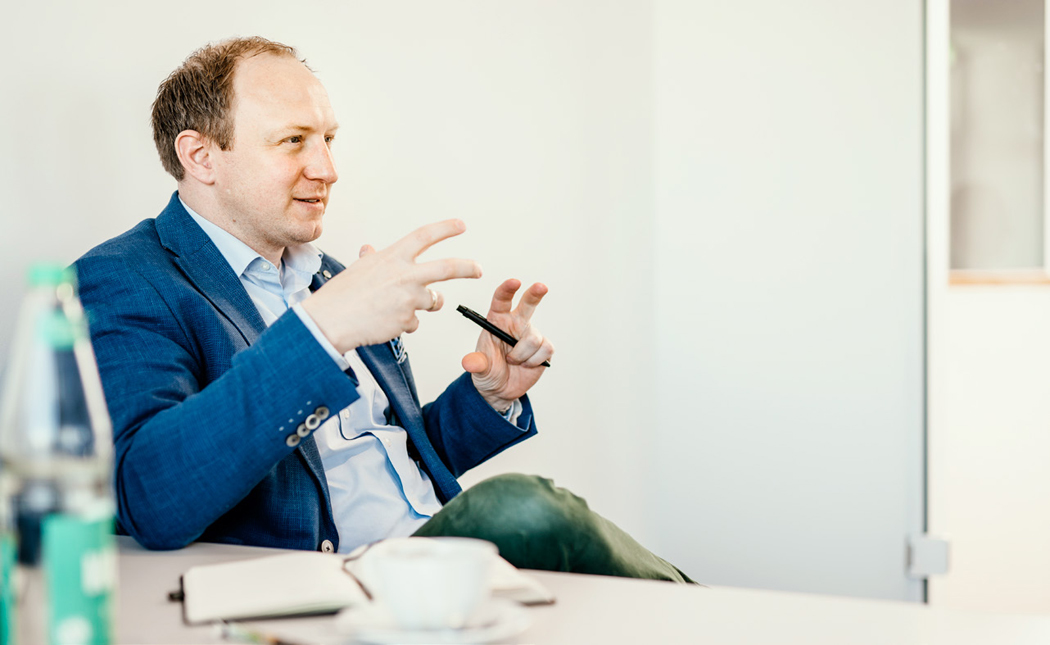
I
t’s a pitch-black night, plus continuous rain and unpleasantly cool temperatures. Under these conditions, the search for the right swap body in a densley-parked depot quickly becomes a game of patience. And patience, as is well known, is not one of the pronounced strengths found in logisticians. “If, in future, a tablet app could show our driver exactly where the swap body he is looking for is parked at the depot, we will have achieved our goals: greater efficiency thanks to the time saved, a reduction in the workload for our drivers by eliminating stress factors and, at the same time, ensuring the high degree of quality associated with our transport operations”, explains Felix Wienkämper, who is responsible for digitisation projects in the family business. Even if the smart control of the swap body pick-up still sounds like a dream of the future, it is important to create the initial prerequisites for it now: “We can’t wait until technology reaches its optimum and everything is running autonomously, we have to start today – taking it step by step.”
“No matter what digital strategy a company pursues – it only works if you implement it consistently.”
Felix Wienkämper
Relying on telematics
The transport company’s 1,000+ swap bodies have, therefore, been fully equipped with telematics for years, in order to enable tracking and identification at all times – initially with modules from another provider, and for the last two years with Krone’s telematics system. W. Wienkämper has been buying mobile transport equipment from Krone for decades, so the new offer quickly fell on receptive ears. “The integration of existing telematics, as well as the willingness for further joint development tipped the scales,” Felix Wienkämper explains further. “With our manufacturer-independent platform, we are open to third-party systems and can back up our claim that we can make data available exactly where it is needed for the success of transport companies,” confirms Maximilian Birle, Head of Sales & Service Telematics and Digital Services at Krone. “The development partnership with W. Wienkämper again serves as a valuable source of impetus and practical experience.”

In order to be able to map the complexity of scheduled services digitally, functioning interfaces between the systems are essential. In the future, it should, therefore, be possible to seamlessly transfer telematics data into the transport management system. Felix Wienkämper: “The trick is to bring the data together on one platform and extract utility values from it – for our customers, our drivers and our dispatchers.” The first specific results of the collaboration include the consolidation of various systems on the Krone Telematics portal and in-house programming that enables Wienkämper to control the distribution of swap bodies to the various DPD depots.
Ensuring quality
This is because the transport company not only drives for the parcel service provider, but is also closely integrated into its network and route planning. For example, constantly changing specifications have to be met as to how many swap bodies are needed at the respective depot. The organisation of scheduled transport operations with a focus on Germany, France, Benelux and Poland is a highly complex matter that requires extensive experience. The specialisation of the third-generation family business is closely linked to the development of the CEP sector. Since DPD was founded in 1976, W. Wienkämper has developed expert level competence in the handling of swap bodies, and has grown successively. Freight forwarding has also benefited from the e-commerce boom of recent years and the associated volume growth. “However, at the same time, customer demands for efficient processes and reliable delivery are growing. This is another reason why digital technologies for quality assurance are indispensable for us today,” Felix Wienkämper continues.
PROFILE
The company W. Wienkämper GmbH has been providing national and international transport services for more than 90 years. When DPD was founded in 1976, the company began to transport swap bodies for the parcel service provider. Clear positioning and specialisation in scheduled and system transport operations formed the basis for continuous growth. Today, the fleet includes over 1,000 swap bodies and 160 articulated trains. W. Wienkämper is being managed in its third generation and employs over 250 people.
www.wienkaemper.com
www.wienkaemper.com
By its very nature, any change has to be made during ongoing operations without interfering with day-to-day business. The strategy is therefore, to break down comprehensive objectives into stages and individual measures. One recent step: Since the autumn of 2021, drivers have been successively equipped with tablets, and the roll-out will be completed by the summer of this year. The mobile device is intended to relieve the drivers’ daily workload and simplify numerous routine tasks – from the transmission of the next route to shift reports, annual leave planning or expense reports. Based on initial experience, the user interface is continuously optimised, in order to ensure the app’s intuitive and secure handling.

Benefits for the employees
The digital processes also make scheduling easier. If only one telematics portal has to be operated, this already makes a significant contribution to reducing complexity. This applies to route planning, as well as for example, compliance with deadlines according to Germany’s accident prevention regulations (UVV). “You can no longer control over 1,000 swap bodies manually,” Felix Wienkämper continues. “Digital technology thus relieves our employees and removes unnecessary stress factors for them.” The company expects this to increase efficiency and have a positive effect on retaining existing employees or attracting new ones. This also makes it easier and more effective to train new drivers and dispatchers. Finally, optimised processes support the sustainability goals pursued by the transport company, for example, through a more efficient use of resources, or the continued reduction of kilometres driven without freight.
Implementing digitisation consistently
High-level customer demands, necessary investments in digitisation, increasing complexity – Felix Wienkämper believes that this development can lead to a crowded-out market: “Ten years from now, our business will be completely different from what we do today.” This makes it all the more important to recognise and actively use the opportunities as the arise: “No matter what digital strategy a company pursues – it only works if you implement it consistently.” The perseverance required for a gradual implementation should pay off – at least, when drivers no longer have to search for a long time on a rainy night, but rather are guided directly to the right swap body thanks to digital assistance.

Photos: Steffi Behrmann Fotografie




